 |
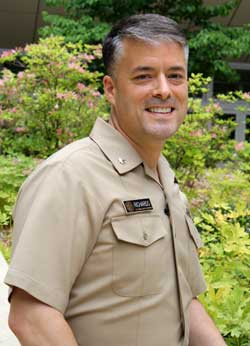
|
|
Kelly Richards, Nurse, Pediatric Oncology Research Nurse, National Cancer Institute (NCI), National Institutes of Health
|
1. I chose this career because...
2. My typical workday involves...
3. What I like best/least about my work...
4. My career goals are...
5. When I'm not working, I like to...
|
|
1. I chose this career because...
|
Back to Top

|
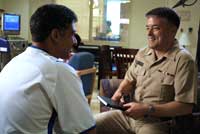
|
|
Kelly Richards enjoys interacting with his patients and their families and is pictured talking with the father of a current patient.
|
I chose to become a nurse because I was inspired by a nurse who worked with premature babies. At the time, we were both serving in the Washington Air National Guard. I was a medic and she was a nurse in the neonatal intensive care unit who flew with a specialized transport team. Over the next several years, she mentored me and I became interested in this nursing subspecialty.
After high school, I started my career by joining the United States Marines. After completing my service in the Marine Corps, I entered into a nursing program at Eastern Washington University. During my college years, I also served with the Washington Air National Guard, which is similar to the Air Force Reserve.
After earning my nursing degree, I returned to active duty in the military. This time, however, I joined the United States Air Force. My first job as a nurse in the Air Force was on the unit that took care of healthy newborn babies and mothers. After working on this unit for a year, I changed jobs and worked in the neonatal intensive care unit, where I learned how to take care of critically ill babies. This position took me from California to Germany, where I worked at a U.S. military hospital. Following this assignment, I then managed a pediatric clinic at the U.S. Air Force Academy for a year.
I then transferred to the United States Health Service (USPHS) Commissioned Corps. My first position as a nurse in the USPHS was with the Federal Bureau of Prisons. While there, I was part of a team that opened a medical center for federal prisoners in Butner, North Carolina. I stayed in this position for 18 months.
After completing my assignment with the Federal Bureau of Prisons, I took a position as a clinical research nurse at the NIH Clinical Center. Here, I began my specialty in pediatric oncology nursing with patients who were participating in clinical research trials with new treatments for pediatric cancers. In this position, I was responsible for directly administering the different treatments that patients were receiving. I stayed in this position for approximately 7 years, eventually transitioning into my current position with the NCI as a research nurse specialist. In this job, I am responsible for developing and monitoring clinical trials. I work with patients, their families, government agencies and drug companies.
Currently I hold the rank of Commander as a member of the USPHS-Commissioned Corps.
Education
|
|
2. My typical workday involves...
|
Back to Top

|
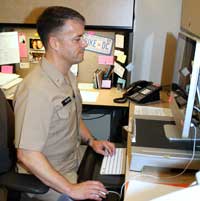
|
|
Kelly Richards sits at his desk and responds to emails, reviews protocols, and reads peer reviewed research articles published in clinical journals.
|
My typical workday is never the same. It varies depending on my schedule and duties for the day. Many times I work long hours, arriving early and leaving late. As a research nurse specialist, I am responsible for monitoring patients involved in clinical trials at the NCI. This job is an administrative position. There is no clinical care involved. Clinical trials are carefully defined research studies that aim to find better ways to prevent, diagnose, or treat cancer. My patients are children, including infants to adolescents, teens and even some adults who have cancers that are normally found only in children.
At the NCI, a research physician, also known as the principal investigator (or PI), develops the protocol. A protocol is a specific set of instructions that guides the treatment of a patient or group of patients. The PI leads a team of professionals that may specialize in different areas of healthcare. I work as a part of that team to carry out therapies that are defined in the protocols. This is very detail-oriented work. It is critical to adhere to the protocol. All patient care must be tracked and documented. We are held legally accountable for all the patient data we collect. There are many regulatory agencies that govern human clinical trials. We must meet all the regulatory requirements and are responsible for the associated documentation.
In order to maintain my clinical skills, I also work in a pediatric emergency room at a local community hospital several times a month. This keeps me current on the clinical aspect of my profession.
My experience as a nurse has taught me that a nurse needs to be strong in both math and sciences, written and oral communication and be very detailed oriented.
My major duties include:
- following clinical trial protocols to provide patient care
- monitoring patient progress
- documenting all patient care
Clinical Research
Our research focuses on leukemias. The NCI defines leukemia as a “type of cancer that starts in blood-forming tissue such as the bone marrow and causes large numbers of blood cells to be produced and enter the bloodstream.” Different symptoms are present, depending on the type of blood components that are affected.
In our clinical trials, we use two therapeutic approaches:
- Bone Marrow Transplantation – In this approach, we harvest a donor’s bone marrow, which contains stem cells. Stem cells are immature cells that are the precursors to functioning blood cells. The donor’s bone marrow is then transferred to the patient where it can restore fully functioning blood cells the patient needs to live.
- Targeted Immunotherapy – This is a type of therapy that specifically targets the cancer cells by interfering with their growth. In one of our clinical trials, we are using a newer approach that uses a harmful bacteria in a new way to kill the cancerous cells.
|
|
3. What I like best/least about my work...
|
Back to Top

|
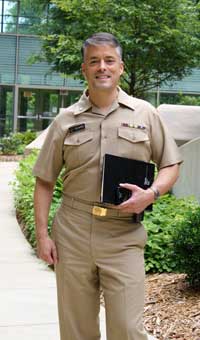
|
|
Kelly Richards has a dual track career, working as an NCI nurse and serving as a Commander in the United States Health Service (USPHS) Commissioned Corps. He is pictured in his USPHS uniform.
|
What I like best about my work is being able to help other people, especially the children that come in for treatment. I like interacting with the children and their families. Recently, I worked with staff at the Children’s Inn at NIH to open up a new house (the Woodmont House) near the NIH for children undergoing treatments and their families. The home will be used for patients needing extended stays, such as those receiving bone marrow transplants. You can read more about this effort in the January 8, 2010 issue of The NIH Record.
What I like least about my work is that we can’t heal everybody. To find a cure for cancer is a lofty goal, but one that we all strive to reach.
|
|
4. My career goals are...
|
Back to Top

|
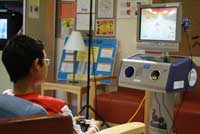
|
|
A young NCI patient spends some free time playing a game in a Clinical Center recreation room.
|
My career goals are to continue to explore new therapies and expand my research on the treatment of childhood cancers. I feel that I have reached the pinnacle of my career, and want to continue in this work.
|
|
5. When I'm not working, I like to...
|
Back to Top

|
When I’m not working, I like to play sports, bike, and spend time with my three children. I enjoy traveling as well. I skydive and am currently learning how to SCUBA dive. Several times a year, I travel to Central America and other areas where there is a need and bring medication and food. For me, being a nurse is not just a job; it is a way of life.
|
|
|
|
 |